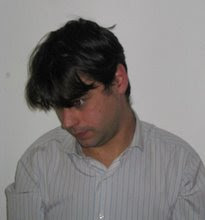 Judith Mudd is the Head of the British Sociological Association. She woke up on tuesday morning, had breakfast with her husband (tea, eggs and bacon) and gave fish cakes to her dog. She took her car and drove to her work. While driving, she thought about lines she read in bed in George Orwell's 1984:
Judith Mudd is the Head of the British Sociological Association. She woke up on tuesday morning, had breakfast with her husband (tea, eggs and bacon) and gave fish cakes to her dog. She took her car and drove to her work. While driving, she thought about lines she read in bed in George Orwell's 1984:
"You haven't a real appreciation of Newspeak, Winston. Even when you write it you're still thinking in Oldspeak. I've read some of those pieces that you write in The Times occasionally. They're good enough, but they're translations. In your heart you'd prefer to stick to Oldspeak, with all its vagueness and its useless shades of meaning. You don't grasp the beauty of the destruction of words. Do you know that Newspeak is the only language in the world whose vocabulary gets smaller every year?"
She parked her car in front of the company building, said "Hello" at the reception desk and stepped in the elevator. And she thought again. "Don't you see that the whole aim of Newspeak is to narrow the range of thought? In the end we shall make thoughtcrime literally impossible, because there will be no words in which to express it."
She took her phone to call her collaborators for an emergency meeting. She told each one of them how important that was. And so, at 10, all of them left their occupations and hurried to the main meeting room. Before she started to speak, she tried once more to remember what she read the night before. "Even now, of course, there's no reason or excuse for committing thoughtcrime. It's merely a question of self-discipline, reality-control. But in the end there won't be any need even for that. The Revolution will be complete when the language is perfect."
And then she said what she had to say, people heard what they had to hear.
A few months later, her husband was reading the Telegraph in the garden. Judith Mudd was in the garden too, trimming the hedge. Her husband found an article, which he began to read out loud:
"Publishers and universities are outlawing dozens of seemingly innocuous words in case they cause offence. Banned phrases on the list, which was originally drawn up by sociologists, include Old Masters, which has been used for centuries to refer to great painters - almost all of whom were in fact male. It is claimed that the term discriminates against women and should be replaced by "classic artists". The list of banned words was written by the British Sociological Association, whose members include dozens of professors, lecturers and researchers. The list of allegedly racist words includes immigrants, developing nations and black, while so-called "disablist" terms include patient, the elderly and special needs.
It comes after one council outlawed the allegedly sexist phrase "man on the street", and another banned staff from saying "brainstorm" in case it offended people with epilepsy (...)
The list of racist terms features black, which "can be used in a racist sense" and should be changed to "black peoples" or "black communities". Immigrants is said to have "racist overtones" because of its association with "immigration legislation", while developing nations - intended as a more sensitive replacement for Third World - is "prejudical" because it implies a comparison with developed countries.
Although not included on the Policy Press list, the BSA warns authors against using civilisation because of its “racist overtones that derive from a colonialist perception of the world”.
He dropped the paper, looked at his wife and said: "Oh darling, I'm so proud of you. Don't you think we should invite the Spencers tonight to share this achievement?" She shrugged her shoulders and answered: "It's no big deal, you know. Just a little step further on the road of progress."










No comments:
Post a Comment